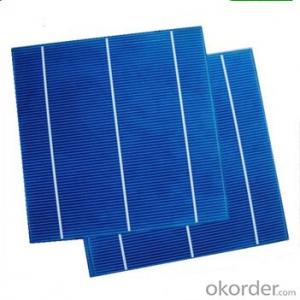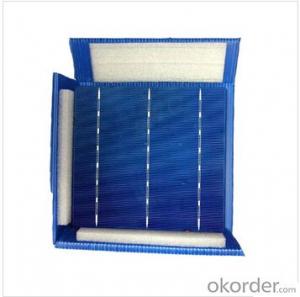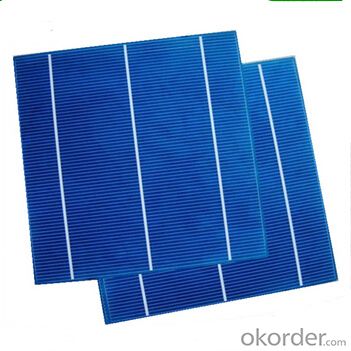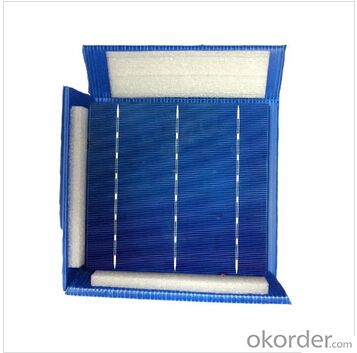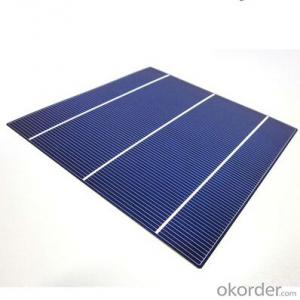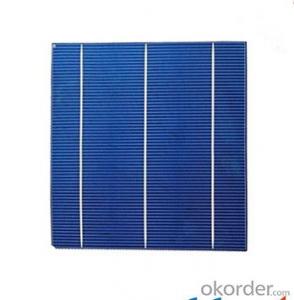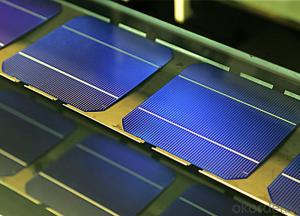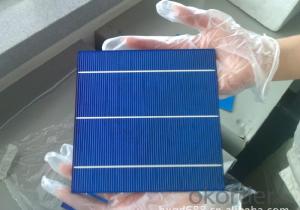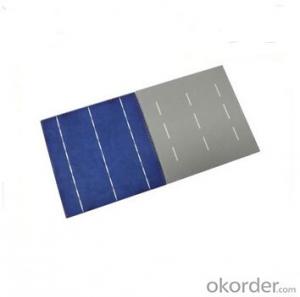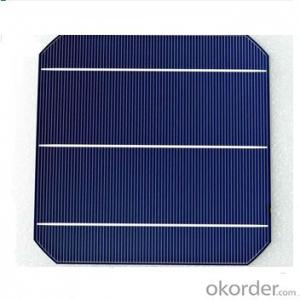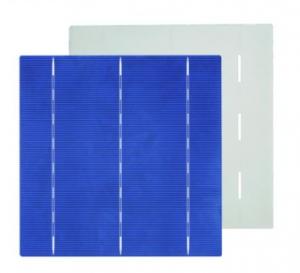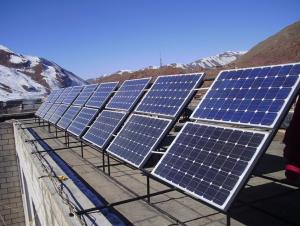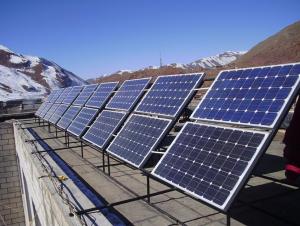Multicrystalline Silicon Solar Cells - 17% Efficiency Polycrystalline Solar Cells Series
- Loading Port:
- Shanghai
- Payment Terms:
- TT OR LC
- Min Order Qty:
- 1000 pc
- Supply Capability:
- 100000 pc/month
OKorder Service Pledge
OKorder Financial Service
You Might Also Like
Solar Cells:
Solar cells is made by solar wafer, it has three categories of solar cell right now, monocrystalline polycrystalline and thin film,These cells are entirely based around the concept PN junction, which is the critical part of solar module, it is the part that can convert the light energy into electricity, the thickness is from 180um to 200um, with even busbars to conduct electricity, textured cell can decrease diffuse reflection; they are often electrically connected and encapsulated as a module. Photovoltaic modules often have a sheet of glass on the front (sun up) side, allowing light to pass while protecting semiconductor wafers from abrasion and impact due to wind-driven debris, rain, hail, etc. Solar cells are also usually connected in series in modules, creating an additive voltage. Connecting cells in parallel will yield a higher current;With high quality and stable quality. Our Cells can greatly improve the performance of Solar Modules.
Features:
1. High conversion efficiencies resulting in superior power output performance.
2. Outstanding power output even in low light or high temperature conditions
3. Optimized design for ease of soldering and lamination
4. Long-term stability, reliability and performance
5. Low breakage rate
6. Color uniformity
Solar Cells Advantage:
1. Tire-1 Solar Cells’ Manufacturer Quality Guarantee. With a complete and sophisticated quality government system, our Quality Management have arrived world’s leading place. Customer can receive Tire-1 Cells Maker’s Quality Standard Products.
2. Trusted Warranty. We can supply trusted after-sales service to our customer. If our cells are found not in conformity to the specification of manufacturer, or should the inspected quantity found in shortage, or should the packing found damaged, the buyer has the right to claim to the seller. The claim, if any, should be presented to seller within 30 days after cargo's arrival date to the port, together with related inspection report and photos issued and provided by a reputable independent surveyor such as SGS.
3. World’s Leading Manufacturer Equipment. We imported the newest and leading production equipment from abroad. Advanced equipment can guarantee the stable quality of cells. Auto production line can also save labor cost which will further cut our production cost.
4. Bulk supply: With the production capacity of 500MW, we can produce large quantity every month. This can satisfy most customer requirement.
Specifications:
1.Size:156x1156±0.5mm thickness:200±20μm
2.Covered with derk blue silicon nitride antireflection coating;3 busbars of 1.5mm width and 80 fingers
3.Covered with aluminun BSF;15 welded substrate(silver)of 9x3mm size.
Eff(%) | Pmpp(W) | Vmpp(mV) | Impp(A) | Voc(mV) | Isc(A) |
19.00-19.20 | 4.55 | 537 | 8.402 | 635 | 9.014 |
18.80-19.00 | 4.50 | 535 | 8.396 | 635 | 8.986 |
18.60-18.60 | 4.46 | 534 | 8.313 | 633 | 8.947 |
18.40-18.60 | 4.44 | 532 | 8.311 | 630 | 8.856 |
18.20-18.40 | 4.39 | 530 | 8.261 | 629 | 8.827 |
18.00-18.20 | 4.37 | 524 | 8.241 | 628 | 8.819 |
17.80-18.00 | 4.33 | 523 | 8.173 | 627 | 8.785 |
17.60-17.80 | 4.3 | 519 | 8.161 | 626 | 8.734 |
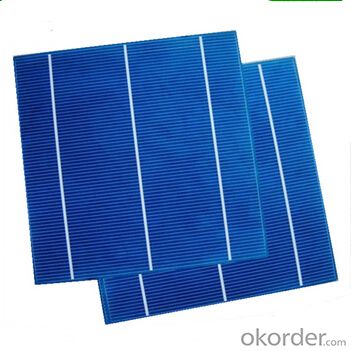
FAQ
We have organized several common questions for our clients,may help you sincerely:
①What price for each watt?
It depends on the efficiency of the solar cell, quantity, delivery date and payment terms.
②How long can we receive the product after purchase?
In the purchase of product within three working days, We will arrange the factory delivery as soon as possible. The pecific time of receiving is related to the state and position of customers.Commonly 7 to 10 working days can be served.
③Can you provide the peripheral products of the solar panels, such as the battery, controller, and inverter? If so, can you tell me how do they match each other?
Yes, we can, we have two companies for solar region, one is CNBM International, the other is CNBM engineering Co.
We can provide you not only the solar module but also the off grid solar system, we can also provide you service with on grid plant.
④What is your warranty of solar cell?
Our product can promise lower than 0.3% open box crack, we support claim after opening the box if it has crackm color difference or sth, the buyer should give pictures immediately, we can not accept the claim after the solar cell has assembled to solar panel.
• Timeliness of delivery
• ⑤How do you pack your products?
We have rich experience on how to pack the solar cell to make sure the safety on shipment, we could use wooden box or pallet as buyer's preference.
- Q: Can solar cells be used in powering electric boats?
- Yes, solar cells can be used to power electric boats. Solar panels can be installed on the boat's surface to capture sunlight and convert it into electricity, which can then be used to power the boat's electric motor and other electrical systems. This enables the boat to operate without relying on traditional fuel sources, making it a more environmentally friendly and sustainable option.
- Q: How much maintenance do solar cells require?
- Solar cells require very little maintenance. They are designed to be durable and can last for several decades with minimal upkeep. Routine maintenance typically involves cleaning the surface of the solar panels to ensure optimal sunlight absorption and occasionally checking for any damage or debris. Overall, solar cells are a low-maintenance energy solution.
- Q: Can solar cells be used to charge batteries?
- Yes, solar cells can be used to charge batteries. Solar cells convert sunlight into electrical energy, which can be harnessed to charge batteries by connecting them to a solar panel. The solar panel absorbs sunlight, converts it into electricity, and then transfers that energy to charge the batteries.
- Q: How do solar cells perform in areas with high winds?
- Solar cells can perform well in areas with high winds, as long as they are properly installed and secured. The design and installation of solar panels take into consideration factors like wind load and durability. Additionally, some solar panels are specifically designed to withstand high wind speeds. However, excessively strong winds can potentially damage or displace solar panels, so it is important to ensure proper installation and maintenance to maximize their performance and longevity in such areas.
- Q: How do solar cells handle bird droppings or other debris?
- Solar cells are generally designed to be self-cleaning or have a protective coating that prevents bird droppings or debris from significantly impacting their performance. Rainwater or regular cleaning can often wash away most of the dirt or droppings, ensuring optimal solar energy generation.
- Q: What is the role of tracking systems in maximizing solar cell efficiency?
- Tracking systems play a crucial role in maximizing solar cell efficiency by continuously adjusting the position of solar panels to optimize their exposure to sunlight. These systems enable solar panels to track and follow the sun's path throughout the day, ensuring that they are always facing directly towards the sun. By doing so, tracking systems can enhance the amount of sunlight captured by solar cells, resulting in increased energy production and overall efficiency.
- Q: Are solar cells weather-resistant?
- Yes, solar cells are weather-resistant. They are designed to withstand various weather conditions, including rain, snow, and extreme temperatures, without significant damage to their functionality.
- Q: Can solar cells be installed on any type of roof?
- Yes, solar cells can be installed on almost any type of roof, including flat roofs, sloped roofs, metal roofs, tile roofs, and even asphalt shingle roofs. However, the specific installation process may vary depending on the type of roof and its structural integrity. It is always recommended to consult with a professional solar installer to assess the feasibility of installation on a particular roof type.
- Q: I bought a new poly solar cells, and the test result of the conversion efficiency is 16.8%, is it lower than usual?
- I don't think it's lower than normal, 16.8% is pretty common in most of the power plants in my area.
- Q: How do solar cells handle snow or ice accumulation?
- Solar cells are designed to handle snow or ice accumulation by having a smooth, glass-like surface that allows most of the snow or ice to slide off. Additionally, solar cells generate heat when exposed to sunlight, which helps to melt any remaining snow or ice.
Send your message to us
Multicrystalline Silicon Solar Cells - 17% Efficiency Polycrystalline Solar Cells Series
- Loading Port:
- Shanghai
- Payment Terms:
- TT OR LC
- Min Order Qty:
- 1000 pc
- Supply Capability:
- 100000 pc/month
OKorder Service Pledge
OKorder Financial Service
Similar products
Hot products
Hot Searches
Related keywords
